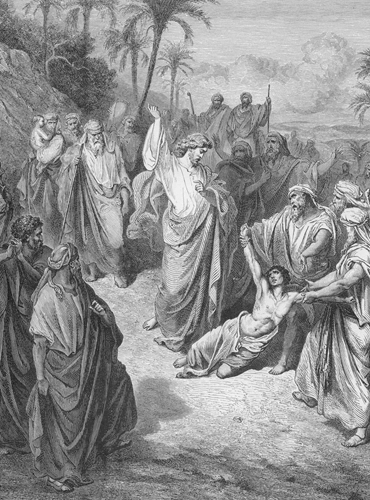Saturday of the Eighteenth Week in Ordinary Time – Mt 17:14-20
Today’s Gospel recounts for us a failed healing of a “lunatic,” and then Jesus’ reply to His disciples when they asked why they couldn’t perform the miracle. We can consider both the man who was sick, and the healing and the reply that Jesus made to His followers, and see how they related to the virtue of faith.
First, regarding the man who was healed, Saint John Chrysostom notes two things: first, the term “lunatic” is what the doctors must have thought was the boy’s problem, and not what was really wrong. In other words, it is common that worldly people seek only worldly explanations of things, whereas, for the one with faith, there is another realm of explanations, another realm of reality, that must be considered. Secondly, although it seems terrible, even the boy’s illness is a display of God’s providence since, had God not restrained the demon from acting, the evil spirit would’ve clearly have killed the boy when it could have. Only God’s will and love restrained the evil spirit from doing so.
Likewise, the Fathers and Doctors of the Church offer symbolic interpretations of the boy’s illness. Saint Augustine says that the fire refers to the fire of anger, and the water to the desires and lusts of the flesh; in this sense, then, the lunatic represents all who are battered by temptations.
Regarding the healing and Christ’s reply, what Saint Jerome points out is worth considering: he says that sometimes healings are prevented by a lack of faith of the healer, as Jesus points out, but it is also possible that the one who needs the healing lacks the faith necessary to receive the miracle. Indeed, Saint John Chrysostom seems to favor this interpretation, that is, that both faiths were weak, as the doctor of the Church notes that Christ encourages the man by telling him “Bring the boy here to me,” and thus gives him hope that his son will be healed. It is this that “permits” the miracle. In His reply, Jesus says that the little faith of the disciples prevented the miracle from taking place, but, as Augustine and other saints have pointed out, there aren’t really recorded miracles of mountains being moved. Instead, they tend to take the reference Jesus makes to mean, first, that if mountains move naturally because of earthquakes or avalanches, how much more could God move those things. Likewise, if someone with faith could ask for a miracle in the physical realm, imagine how much more a person with faith could obtain in the spiritual realm, with conversions, graces, and the like.
So, what does all this mean for us? Today’s Gospel centers on the need for faith. Faith isn’t a list of things we believe, or like to think about; it means a radically new way of looking at things, a way of seeing the world and our place in it. We see the lack of faith of the man, starting from his wrong vision of his son’s illness, his inability to see God’s providence at work, and his lack of hope in a healing. Although they believe, the disciples are not yet firm enough in their faith to work so great a miracle. Lastly, Christ tells us that even a little real faith can work great miracles. We can ask ourselves: where is our faith at? How firmly do we believe in Christ’s words?
Through the intercession of Mary, Mother of Faith, let us ask for the grace to really trust in God and thus see the world in light of His goodness.





